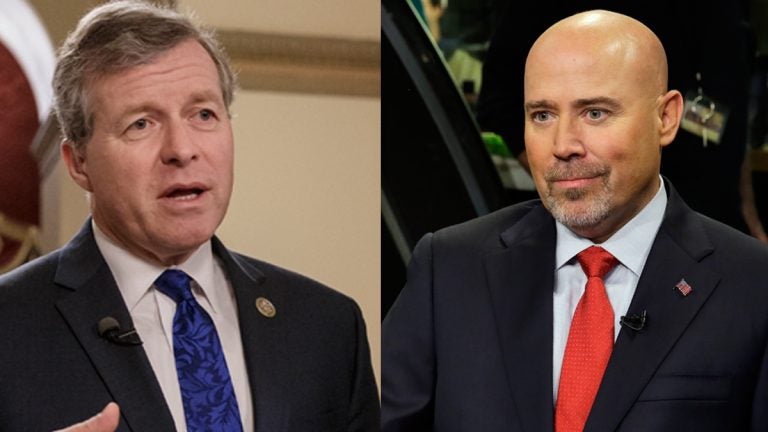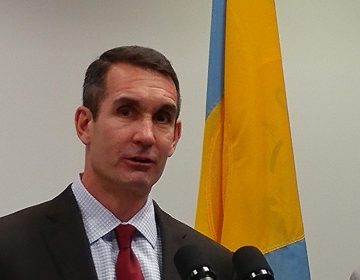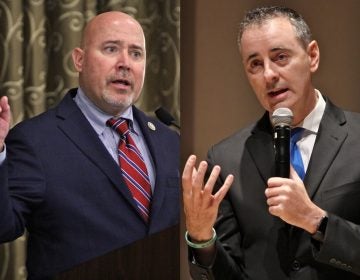GOP conducts post-mortem on failed attempts to dislodge Obamacare
Republican U.S. Rep. Tom MacArthur of South Jersey put his neck out when he teamed up with far-right conservatives to reach the deal that ended with an Obamacare-repeal bill.
Listen 0:00
Republicans U.S. Reps. Charlie Dent of Pennsylvania (left) and Tom MacArthur of New Jersey have been targeted by attack ads over their positions on the GOP health care legislation. (J. Scott Applewhite and Mel Evans/AP Photos)
Republican U.S. Rep. Tom MacArthur of South Jersey put his neck out when he teamed up with far-right conservatives to reach the deal that ended with an Obamacare-repeal bill passed in the House.
So he was a bit deflated when the Senate came up short this week.
“I’m disappointed, because it’s a lost opportunity,” MacArthur said.
The second-term congressman admitted there were flaws in the Senate bill that turned Obamacare funding over to states to spend as block grants. And his bill that could have weakened some Obamacare protections for people with pre-existing conditions wasn’t perfect either, he said. But, MacArthur said, both measures were better than the status quo.
“There are plenty of flaws in both the House and the Senate bill, including the one that I was involved in. There are flaws in that bill,” he said. “I guess we take a deep breath, we go back, and we try to think ‘what are the objectives?'”
MacArthur said his goals have always been fairly simple.
“I tell you what are my objectives have always been — that everyone in the country should have some form of insurance,” he said. “I’ve always said that, some form of insurance, that’s one goal. Two — that we bring down health care cost. All of this is for naught, if we don’t actually bend the health care cost curve.”
But the GOP is at a crossroads. Health and Human Services Secretary Tom Price has been accused of trying to undercut the law by dramatically scaling back outreach and advertising to get more people to enroll for coverage, and President Donald Trump has previously called for his party to just let the law collapse.
Problem Solvers’ turn?
U.S. Rep. Ryan Costello, a Republican who represents parts of four counties west of Philadelphia argues for a different approach.
“I think that’s deeply problematic because that’s a political argument, and we’re talking about families and businesses needing assurances and a sense of confidence that the health insurance marketplace is going to function next year,” Costello said.
Costello is a member of the bipartisan Problem Solvers Caucus, which has floated its own proposal to stabilize the law. It calls for a variety of approaches, such as creating a stability fund to help states lower premiums while also permanently repealing an unpopular tax on medical devices. It also would give states more flexibility to innovate and bring costs down.
“I think that the Problem Solvers assembling that creates a responsible vehicle by which to stabilize it for the coming year,” he said. “I believe the Senate is now looking at that, and that may be in large measure what a bipartisan bill out of the Senate would look like.”
Many Republicans don’t like the sound of that. South Carolina Sen. Lindsey Graham, one of the lead authors of the last failed Senate proposal, said the Problem Solvers’ bipartisan proposal sounds like a bailout for insurance companies.
“I’m not going to take more money and give it to insurance companies. The one thing I’ve learned, if giving money to insurance companies would provide you with better health care, we would have great health care,” Graham said.
Bring Dems to the table, Dent urges
U.S. Rep. Charlie Dent from the Lehigh Valley said fellow Republicans such as Graham have learned nothing if they continue to try passing a GOP-only bill. Dent, who’s retiring after this term, said Democrats need to be at the table now too.
“So that’s where we should start this discussion. We already knew that if we would try to jam the health care reform through in a partisan basis, we have the same kind of problems that Democrats had,” he said. “We need a durable, sustainable reform, so we need to move on a bipartisan basis, center out and do this incrementally.”
Dent said the status quo is unacceptable. He’s hoping GOP leaders will take up the bipartisan Problem Solvers’ bill that also funds Obamacare subsidies in the interim.
“There are some many serious flaws with the health care law or Obamacare, we all know that. And there are parts of this law … that need to be repealed, parts that need to be replaced, parts of it repaired, overhauled and retained,” Dent said. “So I think that the approach that we’ve taken again is incremental in nature. It deals with the immediate problem.”
For now, GOP leaders have moved their attention to a tax code overhaul, but they’re vowing not to give up on their seven-year promise to repeal and replace the Affordable Care Act. That has Democrats worried that Republicans are once again going to try to overhaul one-sixth of the U.S. economy without any input from their party.
WHYY is your source for fact-based, in-depth journalism and information. As a nonprofit organization, we rely on financial support from readers like you. Please give today.




